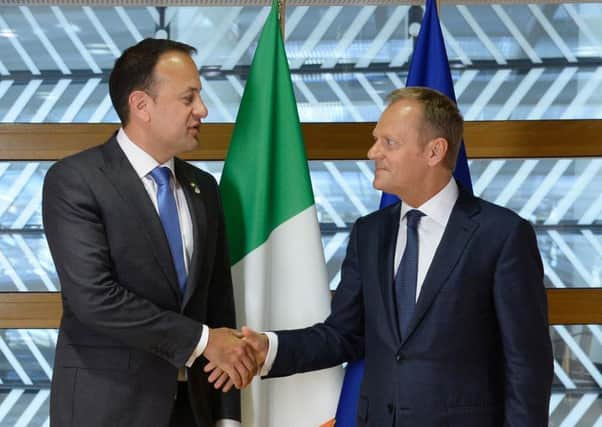Tom Peterkin: Does Brexit mean Irexit for Ireland?


If any evidence were needed that the ramifications of Brexit are exercising grey matter beyond these shores, one need only look across the Irish Sea.
The upheaval caused by the UK’s withdrawal from the EU has spawned some hard thinking on the island of Ireland.
Advertisement
Hide AdAdvertisement
Hide AdUntil now, much of the focus has been on what can be done to maintain the soft border between Northern Ireland and the Republic – an understandable priority given the unhappy, fortified frontier of recent memory.
This week, however, has seen attention turn to a slightly different Irish question. Ray Bassett, a former Irish ambassador to Canada, has written an erudite paper for the Policy Exchange think-tank asking whether the Republic of Ireland should follow the UK and leave the European Union.
In days gone by, the very idea of “Irexit” would have been seen as heresy in Dublin. The Irish Republic’s European credentials were once regarded as impeccable.
These credentials were symbolised by the European funded building projects that sprung up when the Celtic Tiger was at its height and the smart new roads and the other infrastructure projects built as a result of EU largesse.
Perhaps the most obvious sign of the Irish Republic’s close ties to the European project has been the adoption of the euro.
More recently, however, there have been signs that the Republic’s love affair with Europe has been on the wane. According to Bassett, the “nadir” of Irish-European relations was the 2010 bail out when the European Central Bank forced the Irish state to take over the private debts of Irish banks.
“It was a wholly despotic manoeuvre and one that showed no real interest in the welfare of the citizens of Ireland, who saw huge private bank debts thrust upon them and the public purse. This was patently unfair. Ireland’s relationship with Europe would never be the same again,” said Bassett in his paper titled “After Brexit: Will Ireland Be Next to Exit?
As Irish EU sympathies have deteriorated, there seems to have been a thawing of age old Anglo-Irish hostilities.
Advertisement
Hide AdAdvertisement
Hide AdThe work done by the Dublin and London governments to secure the Good Friday Agreement in 1998 and the coming of peace to Northern Ireland has been fundamental to that.
As Bassett points out, this new-found respect has been oiled by trade between Britain and Ireland. The UK accounts for nearly 30 per cent of Ireland’s merchandised imports. Ireland depends on UK energy supplies, with 2012 figures suggesting UK imports amounted to 92 per cent of gas used in Ireland and 93 per cent of refined oil products.
The bombshell of the Brexit vote, which very few people in positions of power in Ireland predicted, threatens to destabilise this carefully constructed relationship.
The Irish finance department has warned that Brexit will precipitate falling growth and rising unemployment.
UK withdrawal from the Common Fisheries Policy will prevent Irish fishermen from fishing off the west coast of Scotland and in the British waters of the Irish Sea.
Bassett argued that even that most Irish of passions – horse-racing – would not escape the Brexit effect.
He quoted the chief executive of Horse Racing Ireland Brian Kavanagh’s fear that there is no market to replace the UK when it comes to exporting race horses.
“Royal Ascot, Cheltenham, Aintree and Epsom cannot be replicated in another country,” was how Kavanagh put it.
Advertisement
Hide AdAdvertisement
Hide AdIrish hopes that financial institutions would flee from London to Dublin as a result of Brexit have yet to materialise. Given these factors, Bassett believes there is a “very strong case” for Ireland to take a different course from its current position to remain firmly in the EU while its closest neighbour leaves.
He suggests opting to remain with the UK in a customs and free trade area, while negotiating as favourable as possible trade and investment terms with the remaining 26 member states.
Doing so would free Ireland from the eurozone. Although Bassett concedes relaunching an independent currency would be expensive and difficult, those challenges would be a price worth paying for Ireland to rid itself of a multi-national currency over which it has minimal control. Crucially, it would also solve many of the problems likely to arise when the UK leaves and turns the Northern Irish border into the only land border between Britain and the EU.
In a sense, Bassett’s vision is the polar opposite to Nicola Sturgeon’s solution for Scotland when faced with Brexit. Where the First Minister advocates Scotland breaking from the UK to protect her position in Europe, Bassett is calling for closer ties with the UK while leaving the EU. What both positions have in common is that both look unattainable politically. The UK government is standing firm against Scottish independence and is determined to protect the integrity of the internal UK market.
In Ireland there is limited political will for Irexit. Polls suggest the vast majority of the Irish people want to stay in the EU while the new Taoiseach Leo Varadkar has rejected Bassett’s suggestions.
Even if – as seems likely – Bassett’s suggestion is not taken up, his report underlines just how tricky Brexit will be – and not just for the UK.